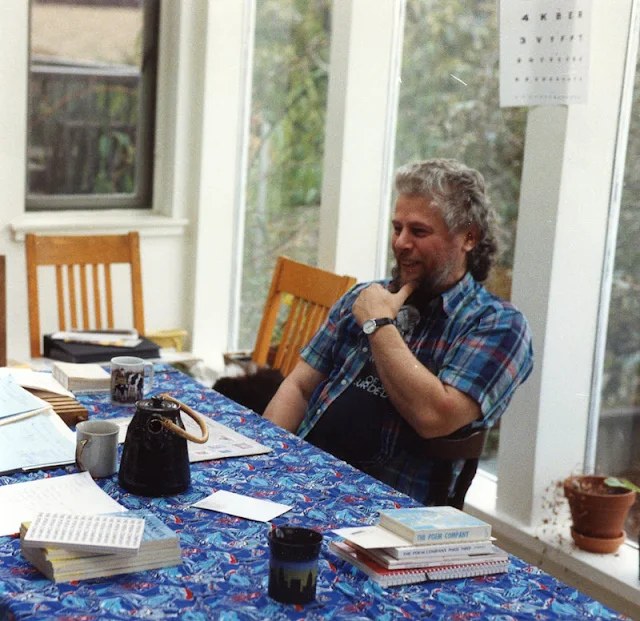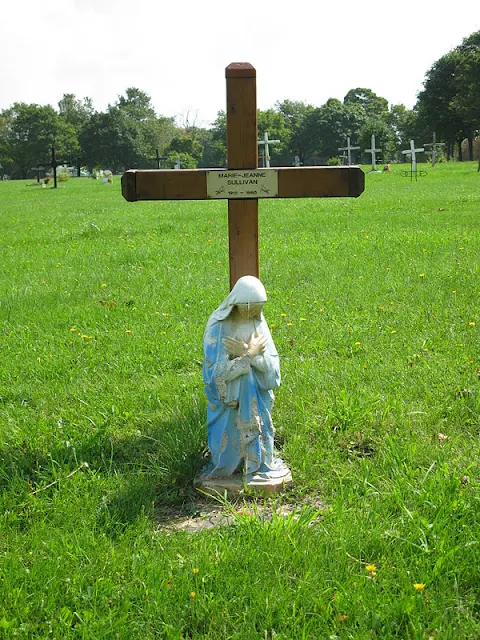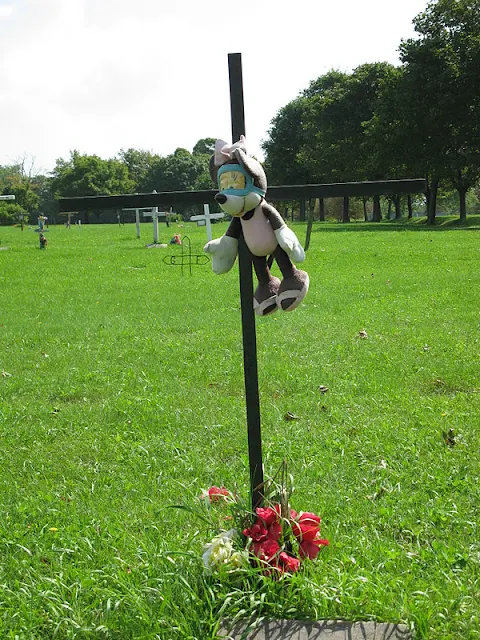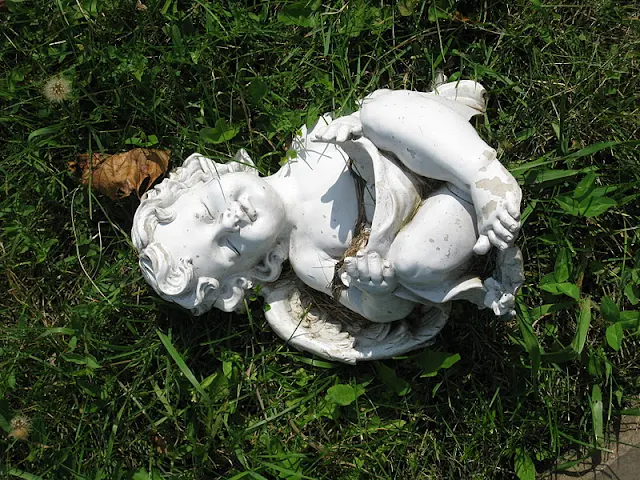Monday, June 25, 2012
Wednesday, June 20, 2012
Lost, found, missing
News Flash! Montreal is the North American capital for deserting animals when people move. It's more than 75,000 animals left behind, dropped off on the roadside, left at the SPCA, or otherwise disposed of as Quebecers move, en masse, every year on July 1st. Maybe people think someone else will move in and adopt their cat, dog, hampster, guppies, or other animals... Individual social responsibility (as opposed to imposed collective action) was never a high point in la belle province. Bob Barker, where are you when we need you?
Re. these photos: I love finding repeated actions on city streets; for instance, lost, found, and missing pet posters. Always home made, they are often plaintive cries for the return of their missing pet. Photos of disappeared cats or dogs, or parrots, taken when the animal wasn't lost, a time of happiness, become mug shots of possibly miserable animals. All of our childhood fears of being deserted by our parents return to us as we look at these posters; context is everything for transformation; the animal now becomes an archdetype for our fears of abandonment.
Friday, June 15, 2012
Sunday, June 10, 2012
Monday, June 4, 2012
Wednesday, May 30, 2012
Ralph Maud in 1995
Friday, May 25, 2012
Nellie McClung in 1991
Thursday, May 24, 2012
Poetry Must be Authentic to Psyche
There is an expression of our psyche in
everything we do including writing poetry. Great poetry is always authentic to
psyche, that is, it is an expression of the psychology, of the soul, of the
depth of perception of the poet.
All poets face the question of whether or
not they will censor what they write, this is something a poet must decide each
time he or she sits down to write if there are any doubts about the writing. We
need to ask ourselves, “If I censor what I write am I being authentic to
psyche?” We don’t have to write everything that crosses our mind, but most of
the time we need to be true to ourselves in our writing.
All poets go through years of
apprenticeship to learn how to write poetry, the lyf so short,
the
craft so long to lerne. There is also the necessity
to be aware of the “insecurity of art”, that being creative, writing poetry,
requires an attitude of insecurity, not thinking you know all the answers.
There is also the important quality of investing in our writing an authenticity
to the psychic content. Without this authenticity, I don’t feel that poetry has
much, or any, significance.
What does it mean to be authentic to
psyche? Poetry that is authentic to psyche is poetry that people anywhere, at
any time, will respond to; they will find this poetry consistent with their own
vision of life, or find their vision enlarged by poetry. Readers can identity
poetry that is authentic to psyche because they resonate to these poems that
speak directly to their soul; it is the reader’s soul that identifies the
authenticity of these poems that speak the truth of life, of existence, to the
reader.
To be authentic to psyche is to be aware of
a mythic quality in poetry. This removes poetry from the merely personal and
quotidian to an impersonal and universal context while still relying on the details
of the personal and quotidian. Being authentic to psyche is to write poetry
that represents the archetypal dimension of psyche. “Real” poetry is always
authentic to psyche, it contains psychic content; that is, there is the presence
of archetypes, symbolism, metaphor, and so on.
Sunday, May 20, 2012
Ken Norris, Artie Gold, and Stephen Morrissey
 |
| Here are the rest of the photos from our evening out at a Chinese restaurant on St. Laurent. Here's Ken Norris on the phone before they had cell phones... |
 |
| Here's Ken at the Gazette's book fair back in 1993. |
 |
| Here I am (ever the conservative) with Ken Norris. |
 |
| There's SM, Ken Norris, and Artie back in 1993. |
Wednesday, May 16, 2012
Visiting Irving Layton in 1997
 |
| Irving Layton, CZ, Noni Howard. |
 |
| Irving and Noni. |
 |
| Irving Layton and SM. |
 |
| Irving Layton lived in his old age on Monkland Avenue, just a few blocks from where we live. I knew Layton's nephew/best friend, Bill Goodwin, who taught at Champlain College when I first began teaching there. Bill would have Irving read at the college every year. I remember, after one reading, driving home with Irving and Bill and talking with Irving. Noni Howard is a poet and an old friend Irving Layton's, she is also an old friend of CZ's, so when she came to visit in 1997 (or 1998) we all went down to Irving's and visited. These photos are from that occasion. Coracle Press will publish a chapbook of Noni Howard's poems this summer: visit Coracle Press. |
Saturday, May 12, 2012
Ed Varney in 1992
 |
| Here's Ed in his kitchen/work space from when he lived in Kerrisdale and he and CZ worked on the Poem Factory publications. |
Wednesday, May 2, 2012
Friday, April 27, 2012
Friday, April 20, 2012
Saturday, April 14, 2012
Friday, April 13, 2012
On the 144th Anniversary of Thomas D'Arcy McGee's Death
On this day, 13 April, in 1868, Thomas D’Arcy McGee was buried from St. Patrick’s Church in Montreal. This is the 144th year since McGee was assassinated in Ottawa and, a week later, his funeral in Montreal. There are two recently published accounts of the night McGee was assassinated on 8 April 1868 outside his rooming house near Parliament Hill in Ottawa.
The first is from Richard Gwyn’s Nation Maker, Sir John A. Macdonald: His Life, Our Times, volume two: 1867-1891 (Toronto: Random House, 2011). Both volumes of Richard Gwyn’s best-selling biography are fascinating and bring to life this important Prime Minister and the age in which he lived. The second is from David A. Wilson’s Thomas D’Arcy McGee, The Extreme Moderate, 1857-1868, volume two (Montreal & Kingston: McGill-Queen’s University Press, 2011). Professor Wilson brings to life an important figure in Canadian history, someone who formed a vision of Canada that is still applicable to our own time. These books are highly readable and I recommend both of them for anyone interested in Canadian history.
Richard Gwyn's account is deeply moving; he writes of that evening:
All day, Agnes Macdonald had experienced a sense of foreboding. Macdonald didn’t get home until after two in the morning. Waiting up for him, she wrote later, “a sort of dread came upon me, as I looked out into the cold, still bright moonlight, that something might happen to him at that hour coming home alone.” But then she “heard the carriage wheels & flew down to open the door for my Husband.”
Shortly afterwards, Agnes heard a frantic knocking on the door. “Springing up I threw on a wrapper & ran into my dressing room, just in time to see John throw up the window & to hear him call out, ‘Is there anything the matter?’” "McGee is murdered, lying in the street, Shot thro’ the head,” the messenger shouted back. Macdonald, accompanied by Hewitt Bernard, immediately raced into town by carriage, where they found McGee still lying where he had fallen outside the boarding house. Macdonald cradled McGee’s head in his arms until a doctor arrived to confirm that he was dead. Only then did Macdonald and the others carry his body to a couch inside. Back home, his overcoat sodden with blood, Macdonald collapsed. As Agnes wrote, “He was much agitated, for him whose self command is so wonderful…his face a ghostly white. (p. 57-58)
David Wilson writes of that same evening:
He (McGee) was in a good mood when the House adjourned shortly after two o’clock in the morning. He had completed his letter to the Earl of Mayo about the Canadian example for Irish reform; he had written to Charles Meehan and Charles Tupper about his literary pursuits; and he had spoken to “great applause” in the House about the spirit of Confederation. By way of celebration, he had bought himself three cigars, lit one of them, and left the House with his fellow MP Robert MacFarlane. It was a surprisingly mild night for early April, and the moon was full. A few yards behind them was a group of four men, employees of the House of Commons. One of them, John Buckley, called out, “Goodnight Mr. McGee.” “Good morning,” he replied. “It is morning now.” He turned off by himself at Sparks Street, walking slowly with the help of his cane; his lodgings, in Mrs. Trotter’s boarding house, were a hundred yards away.
Mrs. Trotter was still up, waiting for her thirteen-year-old son Willie to come home from the House, where he was working as a page. Suddenly, she heard “quick steps passing the dining room window,” followed by “a noise as of some one rattling at the hall door.” A she opened the door, she thought someone had set off a firecracker; then she saw a figure slumped against the right-hand side of the doorway. She rushed back into the hall, reached for a lamp, and realized that her doorway was spattered with blood; she saw the slumped figure fall to the ground and knew immediately that he was dead. His face was unrecognizable.
Detective Edward O'Neill was awoken sometime before three o'clock in the morning. He was well known within Ottawa's Irish Catholic community and was well placed to ask the right people questions. Among other people, he questioned Patrick Buckley (John's brother), who had been chief marshal at the recent St. Patrick's Day parade and was a doorkeeper at the House of Commons and a sometime coachman for both George Brown and John A. Macdonald. At first, Buckley refused to talk. "My God, do you want to ruin me, and have my house burned over me?" he asked when O'Neill started questioning him. As O'Neill kept pressing him for information, Buckley told him to "go to Eagleson's and arrest the sandy whiskered tailor there." Eagleson's was a tailor's shop on Sussex Street; its owner, Peter Eagleson, was one of the leading Fenians in the city, and he had visited the scene of the assasination between four and five o'clock in the morning, when very few people knew about it. All this made him an early object of suspicion; he was the first person arrested in connection with the murder. (p. 341-342)
P.S. 22 September 2018:
McGee's assassination was reported in the Montreal Gazette on 7 April 1868; it states that McGee was killed at 2:30 a.m. just after he left Parliament. The Gazette's account was written at 4:20 a.m. and also states that Sir John A. Macdonald was present soon after McGee died. So, between McGee's death at 2:30 a.m. and when the newspaper report was written at 4:20 a.m., Macdonald was told of McGee's assassination and arrived at McGee's rooming house. How long did it take Macdonald to get to McGee's residence after hearing of his death? Perhaps forty-five minutes, around 3:15 a.m. When did the newspaper reporter arrive at the crime scene? Perhaps at 3 or 3:15 a.m.? Time enough to see Macdonald respond to seeing his friend's body in the street and to help carry him into the rooming house. See my short video on this:
Subscribe to:
Comments (Atom)










































